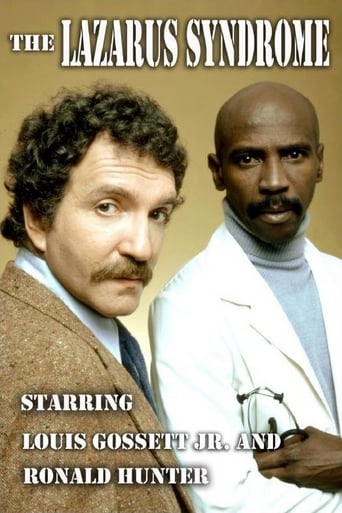ManiakJiggy
This is How Movies Should Be Made
TeenzTen
An action-packed slog
ActuallyGlimmer
The best films of this genre always show a path and provide a takeaway for being a better person.
Bob
This is one of the best movies I’ve seen in a very long time. You have to go and see this on the big screen.
Michael Ledo
Joe Hamill (Ronald Hunter) while playing tennis with his mistress becomes short of breath, has pains in his chest and left arm. He eventually comes under the care of Dr. St. Clair (Louis Gossett Jr.) a cardiologist who becomes indignant that a patient had the nerve to check him out. St, Clair, who is having over blown marriage issues, has to play social director for Joe making sure his wife and mistress don't visit at the same time. And then there is the evil Dr. Mendlel (E.G. Marshall)...The film lacked action or real drama. The characters had only themselves to blame for their issues. The dialogue was corny, even for that age where black people could be doctors but still had to have a black wife. Fairly boring TV movie. Available on a 50 DVD pack.
Bezenby
Lovable cheat Graeme Souness has just had himself one of them heart attacks and ends up under the care of Lou Gossett Jnr (future star of Bram Stoker's Legend of the Mummy). Even though there are many clashes at first between the two (Souness thinks Doctor Gossett's an arse, but then Lou thinks Souness is a chug nut) it's clear that there's a bromance on the horizon.Y'see Lou's a hard-working cardiologist with a cheating wife and Souness is cheating on his own wife and getting Lou to give his wife the run around. There's rather a lot of this going on (as well as medical procedure). Then some sort of plot eventually emerges involving a drug fuelled Doctor. It's not that exciting.I wonder what the show was actually like? The cheeseball freeze frame at the end was good, and the acting was okay, but nothing great.
Wizard-8
This made for TV movie was actually a backdoor pilot for a (very) short- lived series that came the following year. As it turns out, the story in this movie pilot is very self-contained, so one doesn't have to seek the series for further information. Anyway, I am kind of mystified why the network heads green-lit a series from this movie. To be sure, it's not an awful movie. There are some good performances here, the standout being Lou Gossett Jr. as the lead. You can really believe he is a seasoned doctor who knows what he's talking about. And Ronald Hunter does well as the patient who get tangled with Gossett's character, and some real chemistry in their scenes are generated. However, the script needed some work. The subplot about Gossett's home life feels unfinished. And the movie is really slow in introducing the mystery that the leads uncover, and equally slow in resolving it. I've seen worse pilots, but this is one that really needed a doctor - a script doctor, that is.
jcappy
This TV movie rather weakly takes on the issue of big business, hospital ethics, and human health. I say "weakly" because the ending is just too sugared for words, and because the only convincing moments revolve around the relationship of Dr. St. Clair (Louis Gossett), a cardiologist, and Joe (Ron Hunter), his active, questioning, whistle-blower patient. The remainder of the cast is paid little attention to and it is unconvincing, stereotyped, and thin. So one is left with a few strong scenes, a few good ideas... but played in or against a sort of vacuous under-produced world so typical of TV movies.Give credit though for the protest here of the bypass surgery business, the failure of the corporate take over of hospitals and health, and of that "progressive" technology it promotes. But give more credit to actor Ron Hunter's most convincing moments when he puts the medical establishment in both its public and personal manifestations on trial And rarely, if ever, in movies do we experience so strong a view of the patient's ordeal as against the doctor's "pressure." Now, I think back on it, Hunter delivers a kind of powerful manifesto on behalf of the centrality of the patient---one that should not be forgotten and overlooked. And for this, and for some good acting scenes from Gossett, the movie, I think is well worth viewing.

